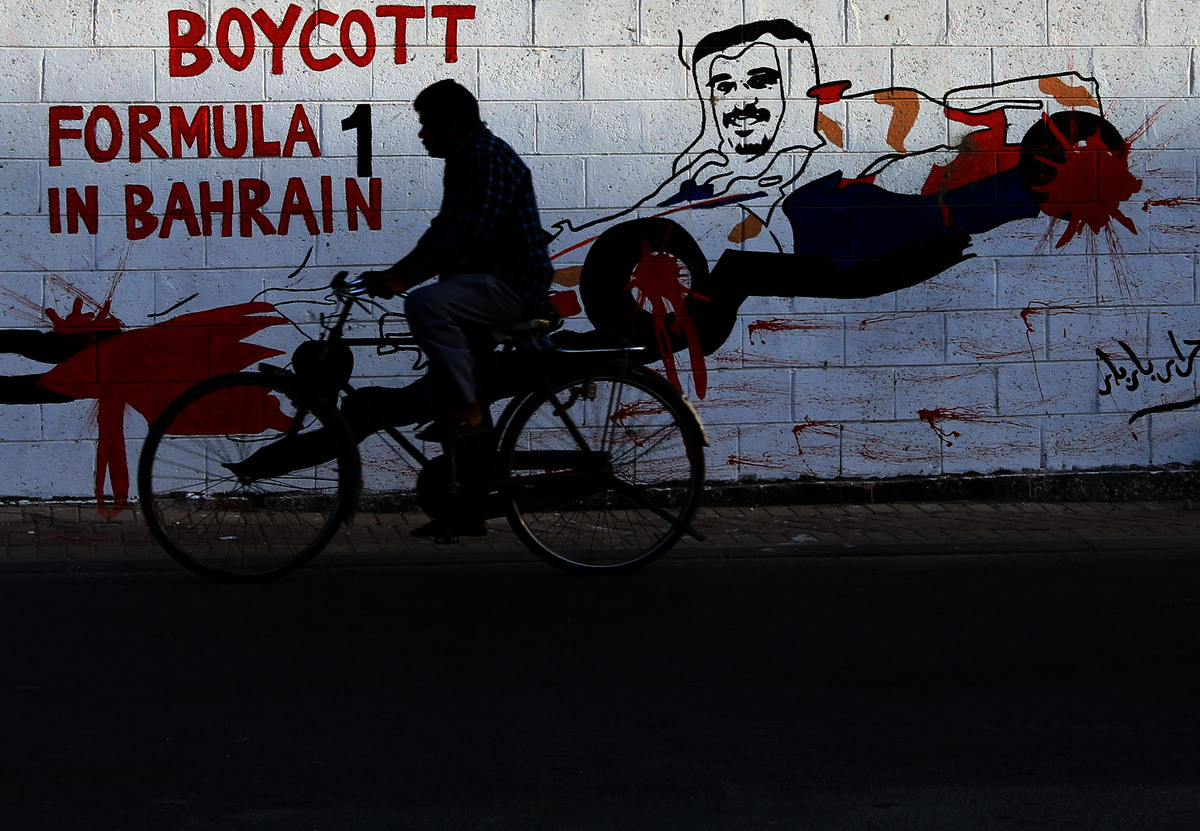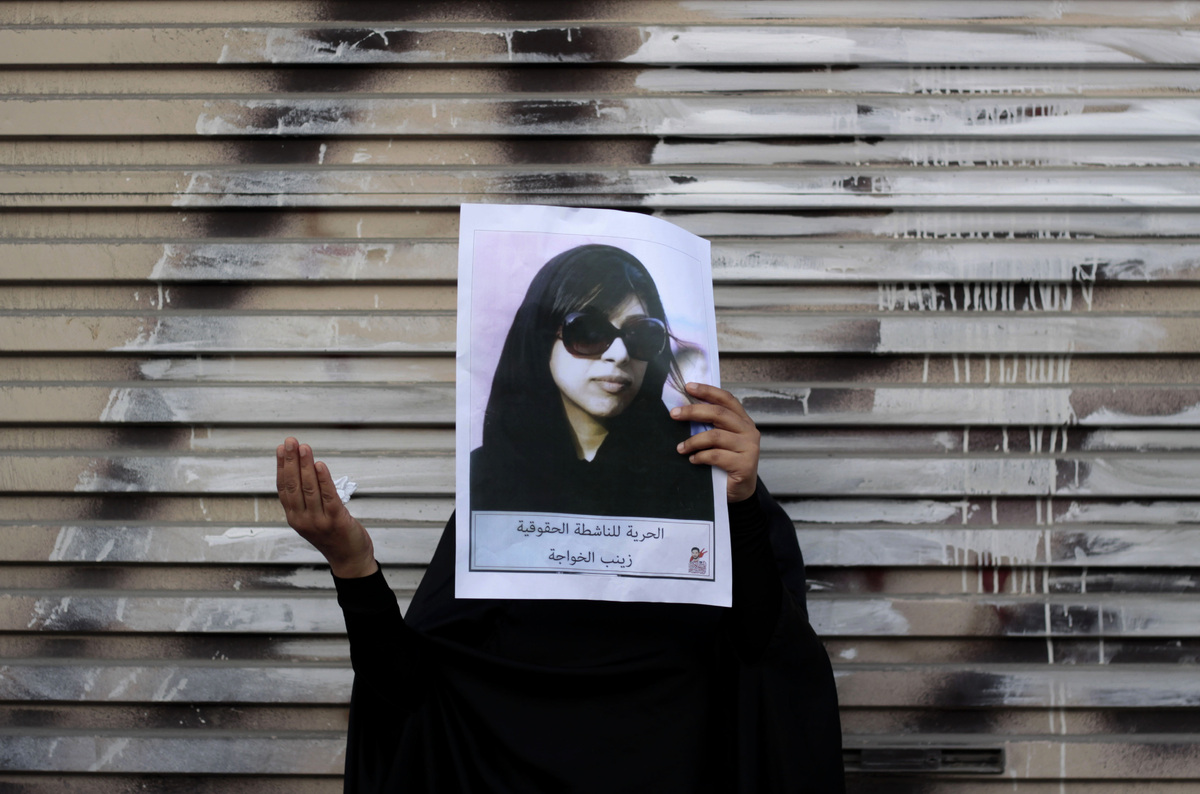Photo credit: Hasan Jamali/AP Photo
Bahrain’s indefinite postponement
of Juan Mendez’s planned May 8th-15th visit to the small island
nation on behalf of the UN Human Rights Council sparks international concern.
The Bahraini government’s decision to cancel this visit, for the second year in
a row, follows a spike in national protests and flying rumors of torturing of
torture within Bahraini prisons. It also falls on the heels of the internally
controversial Formula One Race that was held just a few days ago on April 21st
in the coastal region of al-Manamah, nearby the University of Bahrain.
The
Formula 1 race had to be cancelled in 2011 due to the political unrest
unfolding in Bahrain that year, but the race continued on as planned last year
and this year with increased security despite the mass political protests of
the people. During this year’s April 12th protests of the race where
demonstrators carried signs with slogans like “Stop Racing on Our Blood” and
carried signs of solidarity for jailed Bahraini human rights activist
father-daughter duo Abdulhadi and Zainab
al-Khawaja as well as the activist Nabeel Rajab. To the credit of the Bahraini
government, the April 12th protests were officially approved by the
recently enacted laws cracking down on large protests, which is at least a
small step towards allowing its people to have larger political voices.
It was reported by the Saudi
Arabian online news organization, Arab News, that two Bahraini girls were
arrested for plotting a terrorist attack at the race track. The unnamed girls
were claimed to have been arrested while doing a “dry run” in which one girl
had concealed a pillow under her clothes to test the thoroughness of the track’s
security. The Arab News article continued on to that the Bahraini police claims
to have seized 1000 petroleum based bombs, 72 fire extinguishers intended to be
used as bombs, and 137 tires that protestors were intending to set fire to.
While the protesters in Bahrain are known for low scale violent acts such as
setting tires ablaze at demonstrations, I think we must question the numbers
and possible validity of the rest of the claims in this article. Not only are
there a reason for the Bahraini government to exaggerate the scale of violence
of the protestors, but the Saudi-run paper also has reasons to vilify these
protestors in Bahrain. It is a well-known fact that the Saudi Arabian
government and the Bahraini government have very close ties, close enough that
Saudi forces were deployed onto the small island during the 2011 protests to
help the Bahraini government quell protesters.
Increased protests aren’t the only
concerns of the Bahraini government this past week. In the Bahrain News Agency
an article was published April 24th with Samira Ibrahim bin Rajab,
the Minister of State for Information Affairs and Government’s Official
Spokesperson, making a statement in response to the United States’ State Department’s
2012 Country Reports on Human Rights Practices. Her statement contained the
expected reaction of a country of Bahrain’s limited political freedoms, as well
as a claim that the State Department’s report lacked objectivity and “totally”
sided with “terrorists who seek to sow chaos in the region.” The official
statement included a commitment to comply with human rights principles and
standards while confronting terrorist threats to Bahrain. The statement also
called out the United States’ contradictory stance in the global war on terror,
with its own questionable security measures, while it continues to “deny” the “right”
of other countries to do the same. Frankly, this is a fair, albeit indirect,
way for Bahrain to call out the US for its activities in places like Guantanamo
Bay, and raises equally troubling questions to the US’s validity in calling out
other nations for Human Rights abuses. However, the US doesn’t restrict the
press, free speech, or professional and civilian journalists the same way that
nations like Bahrain do.
Despite these two major events this
past week or so, the Bahraini government is decidedly optimistic about its
economic and socio-political future. With the boastful headline “Bahrain Ideal
for Doing Business” The Gulf Daily News: the Voice of Bahrain published a
pat-on-the-back style article on April 25th in no real news was
relayed, but a few statistics and vague statements about economic prosperity
and possibilities for future growth. Quotes from Industry and Commerce Minister
Dr. Hassan Fakhro following the Bahrain-United Kingdom Business Forum in London
filled the article, stating facts such as Bahrain’s $28k GDP/capita and its
historically strong relationship with Britain in many economic sectors. This
relatively mundane article isn’t the only article within the last week or so
discussing growing and new economic opportunities within Bahrain. A snippet of
an article announced an agreement Bahrain signed with the Islamic Development
Bank on April 24th to help support the countries small agricultural
sector. The projects supported by this agreement are hoped to create new jobs
for young people in the nation to help combat the high youth unemployment.
But what is probably the most exciting—and
politically controversial— economic announcement this week was from Bernie
Ecclestone, the head hauncho of Formula One.
He is quoted as having said that Bahrain has done a “super job” in hosting the
race and hinted at extending Formula One’s racing contract with the nation for
an additional five years. An extension to the contract could possibly become a
point of political contention in the upcoming few years. Already the Formula
One race is a sore spot amongst protesters as they see their political issues
ignored or downplayed in the light of this international race. Since peace
talks between the Bahraini government and al-Wefeq have stalled, it will undoubtedly
be an interesting series of events to watch unfold over the next few years.
Sources:
http://rt.com/news/bahrain-un-torture-investigator-391/
http://www.bbc.co.uk/news/world-middle-east-22265484
http://www.gulf-daily-news.com/NewsDetails.aspx?storyid=352045
http://www.guardian.co.uk/sport/2013/apr/22/bernie-ecclestone-deal-bahrain-gp
http://www.arabnews.com/news/449247
http://www.bna.bh/portal/en/news/558032
http://www.bbc.co.uk/news/world-middle-east-22251998
http://www.gulf-daily-news.com/NewsDetails.aspx?storyid=351999
http://al-shorfa.com/en_GB/articles/meii/newsbriefs/2013/04/25/newsbrief-10
http://www.huffingtonpost.com/2013/04/12/bahrain-protests-formula-1-race_n_3071095.html#slide=2330599
http://www.humanrightsfirst.org/2013/04/19/u-s-state-department-country-report-on-bahrain-highlights-key-abuses/



I think that the Bahraini people are in a very tough situation. They essentially have no way of defeating their oppressive government since it is powerful, wealthy, and backed by Saudi Arabia. It is interesting that these Bahraini women were attempting a terrorist attack with their “dry run” intended to sneak a future petroleum or fire extinguisher bomb in a crowded high profile formula one race.
ReplyDeleteThis brings up an interesting point. Clearly there is no way for the population to overcome their suppressors, so is terrorism an effective means of last resort? Terrorism is the weapon of the weak, and these girls could have made a big statement if successful. Just one bomb set off in a heavily packed area has potential for causing extreme damage as we saw in the Boston marathon bombing last week. The damage at the Formula One track could have caused chaos and attracted international attention. Regardless of any pros the women could have gained in destabilizing their government would have been lost in the international community’s inevitable condemnation of their terrorist strategies. The damage caused any form of indiscriminant killing such as this would make the opposition look like an organized terrorist group which would lend the regime more power to use force in the view of the international, as this could be framed as using force against terrorists (this is what Bashir al-Assad is claiming he is doing now in Syria).
The fact is that the Bahraini regime is strong and wealthy in addition to having very strong and powerful allies in the region. As a result of this I do not see the protests in Bahrain accomplishing anything I do not see freedom for this country in the near future.
I'm not really surprised to read that the Bahraini state is using the media to hide accusations of violence and terror against their people with focuses on stories of job creation and economic growth nor am I surprised when called out for these abuses of human rights that the state would find another country, the U.S. here, to distract people. The state is in a very precarious position. They are maintaining power only because the international community, the Gulf states, have continued to help prop them up. Otherwise, I feel that these protests would have had a much larger impact for the people after two years. As long as Bahrain maintains such a high level of support from their strong neighbors I don't see the people having much luck in creating change. I'm skeptical as well to believe the reports of the government about the attempted bombings of the Formula One race by protestors. It's just a good way for the government to vilify the actions of protestors and make their use of violent measures seems justify to the rest of the world. Everyone responds well to a brave police officer who prevented a horrific act from occurring so stories like this give the state good press.
ReplyDeleteI was just reading the gulf post today and agree that it really isn't surprising that Bahrain is trying to cover up the oppression and violence that's being inflicted upon the citizens. If the Bahraini media does talk about the violence going on its always in a negative light, where "rionters" are harming police officers or other government or military officiants.
ReplyDeleteEven though mass protests in Bahrain seem to be yielding few positive results, I commend the protesters. In the face of torture and arrest many people are still willing to fight for what they believe in. This strength employed by the protests will most likely result in concessions in the near future. In fact research by Chenoweth and Stephan find that even when nonviolence fails there is still a 35 percent probability that of the state becoming a democracy in the next five years. These are not the best odds but they give the protesters something to motivate them. Nonviolence protest can yield positive results it just never happens over night.
ReplyDeleteTrying to present the protestors as terrorists is unfortunately nothing new for the Bahraini regime/press. Since the beginning of the protests, the regime has presented the protests through a sectarian lens rather than a democracy-aspiring lens, and stretched it further to say that Iran was behind the protests ideologically and perhaps even in material support (tires? molotov cocktail recipes?--there is no evidence of that at this point). As people have been saying here, anything to make the protestors look bad and the regime look good they will jump on, and unfortunately, it seems make up. The point is that this is nothing new, or particularly shocking--the regime has a lot of practice with it.
ReplyDeleteI agree with Lindsay, the resilience of these protesters will eventually win, it just takes time. The odds are definitely in their favor, according to Chenoweth and Stephan, 1 and 4 nonviolent campaigns, since 1900, have failed. And those campaigns failed due to their inability to overcome the participation problem, i.e. the failure to recruit a strong and diverse group that can help erode the foundation of their opponent and maintain resilience in the face of oppression. That's a relatively high success rate, patience is just key. Violent repression against nonviolent movements has a tendency to backfire on the regime. What isn't helping their cause is the polarization between the violent and nonviolent protests in the country.
ReplyDelete